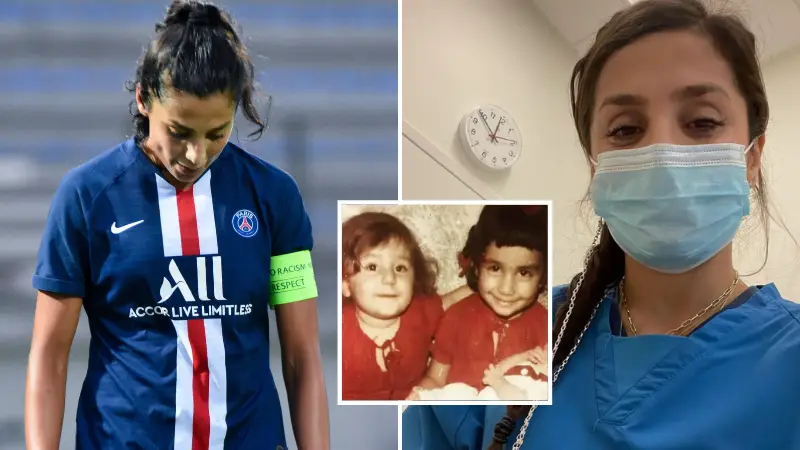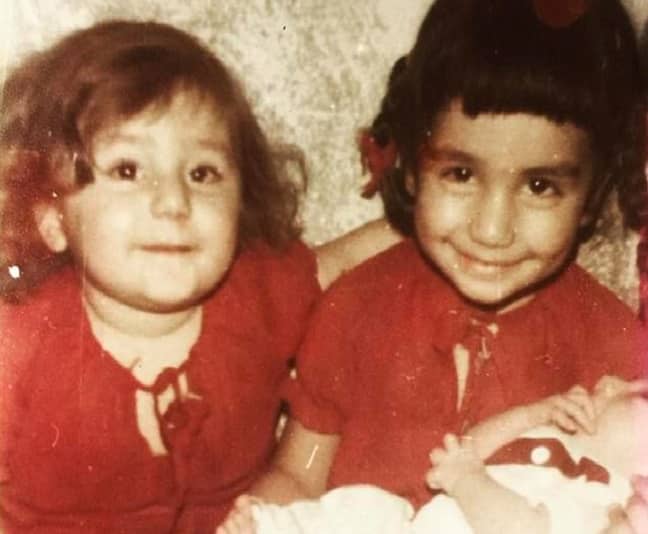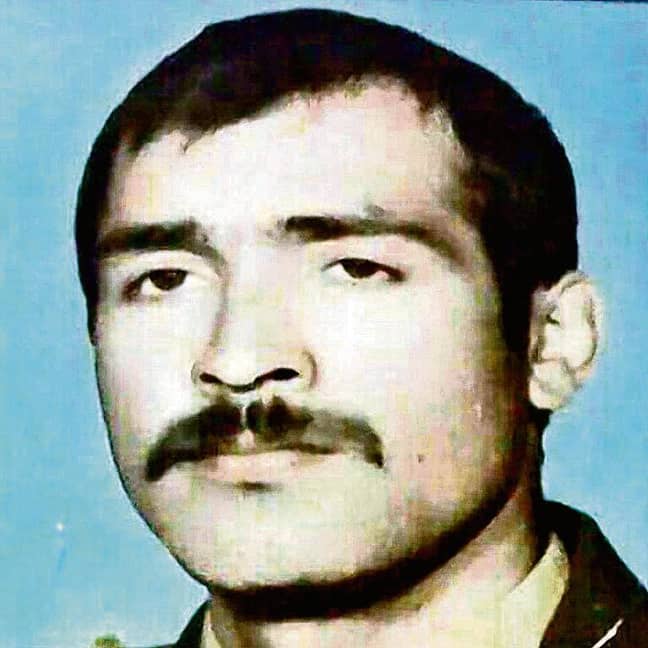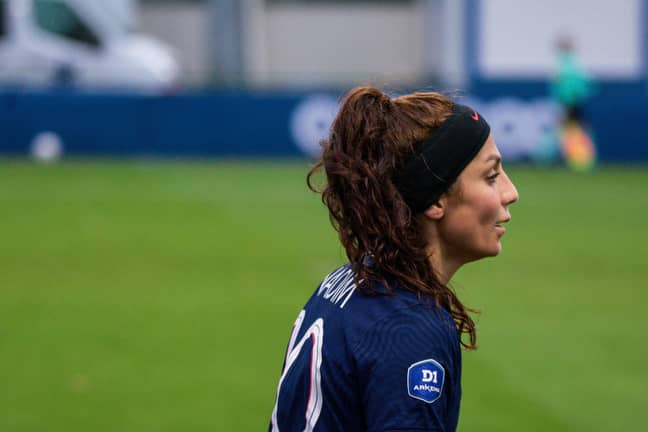
In the football world, Nadia Nadim is a prolific Danish international with 98 caps under her belt. Last season, she played a crucial role in Paris Saint-Germain lifting the Division 1 title for the first time in their history, scoring 18 goals in 27 games.
She is widely recognised as one of the best, and most influential, players in the women's game having spent time at Manchester City, Portland Thorns and Fortuna Hjørring, to name just a few. But her reputation isn't entirely down to her talents on the pitch.
Throughout her life, Nadim has overcome incredible adversity to become the person she is today.
Back in 2000, when she was just 11-years-old, the Taliban took her father from war-torn Afghanistan to the Karbala desert. "For a really long time, I thought he was going to show up," she tells SPORTbible. "My father was like this James Bond type of guy. Like superhero material."
He never returned that day.
Rabani Nadim was a general in the Afghan Army when he was executed by the Taliban as they took control of the country. From that day on, she escaped the country on foot, travelled under a false identity and ended up in a refugee camp, when her destiny became all too clear.
This is the remarkable story of Nadia Nadim; the woman with an important message to spread. "I want to tell the kids and girls, or those who have been through dark times, that it's okay. All of us have been through tough times. You are capable of coming out of it."
Nadim was born on January 2, 1988, in Herat, Afghanistan. She grew up in the city alongside her mother, father and four sisters, who all lived in an area alongside the president's family as her dad played an important role in the Afghan military.
It was safe and secure until the Taliban gained power when she was just 11-years-old.
"It was pure horror... chaos," she remembers. "You heard stories about them coming. They wanted to bring fear amongst the population. The stuff they were doing was crazy. I didn't see all of it because we weren't allowed to go outside as my mother was trying to protect us but you could hear what was going on."
As the Taliban continued to take control of the country, they summoned Rabani Nadim to a meeting. For the next six months, Nadia and her family didn't have a clue what had happened to the man they called dad. She thought he was going to be imprisoned for his role in the army.
That's until one day, her mother, Hamida, found out that Rabani had been killed.
"Like most dictatorships in the history of mankind, if you want to keep your power, you have to remove anyone who has power," she explains. "When the Taliban gained power, one of the first things they did was chop off the heads of the highest people in the government and my dad was one of them."
After her father was executed, women around Afghanistan were not allowed outside if they weren't accompanied by a man. There was a strict regime in place that meant girls weren't even allowed to go to school. It's a time she describes as "horrible".
"You always had to be with someone. Even if you were just going for groceries. You weren't allowed to show any part of your skin. People were living in a constant state of fear. You weren't allowed to listen to music. All the TV stations were cut off. Men were not allowed to wear jeans. You had to have a beard. You were forced to live this idea they have.
"In the end, it got that horrible it became impossible to stay there. It made us leave the country."

The Nadim family were forced to go above and beyond in their attempts to leave Afghanistan. Hamida sold almost all of their possessions, including their apartment, a car and numerous pieces of jewellery.
She gathered as much money as possible to make a getaway while organising their escape.
"I don't know how she got in with the human smugglers, but she did," Nadia tells us. "Obviously, at this point, we weren't really involved in her plans. I was only a kid. In this kind of situation, I don't think she has the time to say 'listen, this is the plan. We are going to this and this,' It wasn't this way.
"We just had to shut up and followed instructions because it was a matter of life or death."
In the middle of the night, Nadia and her family left the country in a small minivan. They didn't have a lot but with hopes of a better life in another country, they drove over the Pakistani border. From there, they stopped in Karachi for two months, where they waited for passports that would fit their profile.
A man eventually found some documentation for their departure and two days later, he handed over some clothing so they could look like those people inside the passport.
"The next thing you know, we were in the airport following this guy," Nadia says. "After that, we took a flight to Italy."
After being dropped off in Italy and spending several days inside a truck with the expectations of arriving in London - where some of Nadia's family were based - the group never arrived in England. It turns out they had been dropped off at a refugee camp in rural Denmark.
"It didn't really matter," she said. "The most important thing is that we were safe."
On their arrival, a guard who worked at the refugee camp would provide a hungry Nadia with a meal consisting of milk, white toast and a banana. 21 years later, she describes that gesture as one of the most important moments in her life.
"It was the best thing anyone has ever done for me," she says. "It's funny because it's only £2 worth of food. But it was the gesture. That act of kindness is what hit me and stuck with me all my life. It had a huge impact on me as a person and it made me think 'that's what I want to do for other people'.
"I try and be real with others and I think he is the reason for that. I think we have to remember that the stuff we do might help someone's day or life. Or even the opposite."
Life was never the same again for the Nadim family after leaving war-torn Afghanistan and amongst all of this, Nadia was convinced that her father would return. "Until I was 15-years-old, even when we were in Denmark, in my brain, I was always that one day he was going to turn up."
He never did.

In total, Nadia, her mother and five siblings lived in the refugee camp for nine months. "For me, It was a time where I could be a kid again," she says. "It was a safe environment. I could go outside and do whatever I wanted. My mum was relaxed and knew nothing was going to happen to us."
During this time in rural Denmark, a curious Nadia was exploring the area when she spotted a group of girls playing football. She was nervous at the time and would hover behind a fence to watch this life-changing moment happen before her eyes.
She would return time and time again.
"At first, you were scared... you didn't know if it was okay to be there. We used to just stand outside the fences and watch the girls play football. I remember it so vividly. Like it was yesterday. When I saw that, I really wanted to be on that field. This is what I wanted to do. I felt like everything was happening in slow motion."
As time went on, Nadia managed to pluck up the courage and ask the coach if she could join in. "I couldn't speak English but I made him understand that I wanted to play. He was so nice. Suddenly I was doing the warm-up and training drills. I didn't know what was happening but it was amazing."
After two months of training with the girls, she received her first call-up to play in a scheduled match.
"I got to wear the jerseys and I was just like, this is freaking amazing."

In a society where women playing sport was normalised, Nadim continued to improve her skills at the refugee camp and, once the family were accepted asylum, her professional career was kickstarted at B52 Aalborg club. Things quickly escalated from there.
She went on to play for Team Viborg, IK Skovbakken and Fortuna Hjørring before moving to America to play in the National Women's Soccer League with Sky Blue FC. It was here, in America, where the prolific forward would impress Manchester City after scoring 19 goals in 37 games for Portland Thorns.
But while her football career was progressing at a rapid speed, Nadim, who speaks seven languages in total, had dreams and aspirations away from the beautiful game, too. Last week, she officially became a reconstruction surgeon after five years of study whilst playing professional football.
"I wanted to help people," she tells us. "I love football but I've never thought of it as a job. It's just my passion. Even though I get paid money to do it, I would happily play for free. For me, I wanted to do more than that. I wanted to do something where I could have an impact on people's lives.
"Being a doctor produces situations where you can help them. I loved it from the start semester. It's so me. I love interacting with people. I love being at the hospital, when you smile at someone and it brightens up their day. The pressure you have on your shoulders as well, I love that."
In her spare time away from football, Nadim visits refugee camps around the world to tell her story and inspire others to follow their dreams; just like she did after watching those girls play football from behind the fence.
"I want to tell the kids and girls, or those who have been through dark times, that it's okay.
"All of us have been through tough times. You are capable of coming out of it. I remember when I was in those places, at some points, I just couldn't see that. I didn't know who to look up; who to see or what to do.
"When I get the chance to speak to refugee camps, I do, because I know how it is to be there. I want to tell them, listen, I know it feels impossible right now to dream, but don't lose your hope. The day you lose that hope is when it's going to be really tough for you.
"I tell them how amazing the sport is. I can see the impact that it's having. The spark in their eyes when you talk about your passion.
"I say find that spark in you and who knows, you might get out of here. It's worth a shot."
Featured Image Credit: Alamy/Instagram - Nadia NadimTopics: Football, Denmark, Womens World Cup